

Urszula MOTOWIDLAK and Tomasz A. KARKOWSKI
Department of Logistics and Innovations Faculty of Economics and Sociology, University of Lodz, Lodz, Poland

The article concerns the development of low-emission and intelligent transport, in line with the assumptions of the European Green Deal strategy. The strategy is a new path of socio-economic development, which should accelerate the transformation of the European Union’s (EU) economies towards zero-emission solutions. This issue is particularly vital for Poland. The concept of low-emission transport, developed for over two decades, turned out to be ineffective, mainly in terms of reducing CO2 emissions, increasing the share of renewable energy sources (RES) in transport and improving energy efficiency. This is proved by the considerations in the article. The aim of the article is to assess the effectiveness of actions that may determine the further transformation of the transport system in Poland towards low-emission and intelligent solutions, in accordance with the concept of building a global climate and energy order. The article contains desk research, methods of qualitative and quantitative analysis that were used to present and discuss the results of own research. The identification and evaluation of the effectiveness of individual activities carried out as a result of the study brings added value to the literature on the subject in the context of the transition to a sustainable and competitive economy. Investments in new technologies, digital solutions, and mobility patterns are the key instruments of transformation. Future efforts should focus on increasing the use of more environmentally and climate-friendly modes of transport, further shaping new mobility patterns, developing low-emission alternative energy sources, and implementing low- and zero-emission vehicles, including those powered by electricity from RES.